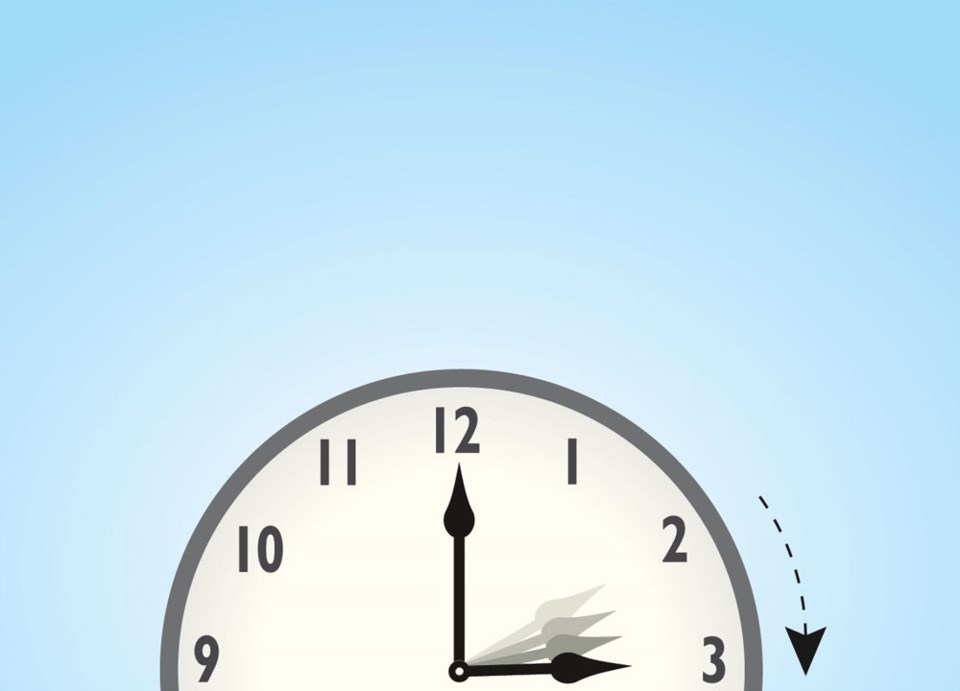Sunday. Too-early a.m. The alarm clock in one ear and the sharp elbow in the other say it’s time to get out of bed.
But why’s it so dark? Honey, did we forget to pay the Hydro bill again? No, it’s daylight time.
We lost an hour of sleep last night. Can’t find it anywhere. It’s probably with your missing car keys, or Trudeau’s re-election chances.
Daylight time used to arrive in April, just like relatives from Alberta, but since 2007, it has landed on the second Sunday in March. Has it really been a dozen years? It feels like it happened yesterday. Or yesterday minus one hour.
A glimmer of light is on the horizon, though. After hearing that politicians in California, Washington and Oregon are all considering doing away with the twice-a-year time change, Premier John Horgan wrote their governors this past week to broach the idea of acting in concert with British Columbia.
The three states and B.C. have too much binding us together for one or two to go off on their own, he said.
“It makes sense to me that we move in unison on this matter,” the letter stated. (Pause to consider how this concept might apply to the 13 municipalities of Dysfunction-By-The-Sea).
“We believe that if we are going to go forward with a change to keep either permanent daylight saving time or permanent Pacific standard time, we need to do it in all four jurisdictions,” Horgan later said.
That’s a much meatier statement than we’re used to. Politicians occasionally make noises about ditching daylight time, but when they do it’s usually in the tone you use when talking about maybe getting around to losing 10 pounds some day.
Those who argue in earnest have tended to be lonely voices, such as B.C. MLA Linda Larson, who wants to switch to permanent daylight time (good idea, we’d get the extra evening daylight in summer without changing our watches twice a year) and Edmonton MLA Thomas Dang, whose attempt to get Alberta to adopt year-round Redneck Standard Time (I might not have that quite right) failed in 2017.
Whose idea was daylight time, anyway? The Americans claim it was Benjamin Franklin, way back in 1784, but the Americans also claim the Vietnam War was a tie, so …
The real instigator was England’s William Willett, who in 1907 published a pamphlet arguing we should spring forward an hour each spring. Everybody scoffed at Willett until 1916, when they changed their minds, which would have been wonderfully satisfying for him had he not died (or fallen back) in 1915.
With the First World War raging, the U.K. reasoned that nobody was going to get any sleep with all that shelling going on, so they might as well get up and go to work an hour early.
British Summer Time, as they called it, was so popular that when the Second World War broke out, they introduced Double Summer Time, advancing clocks two hours past Greenwich Mean Time in summer and one in winter.
If the Third World War ever breaks out, the Brits will be up by walk-of-shame o’clock and back in bed by the end of Coronation Street.
On this side of the Atlantic, almost all of Canada changes its clocks today, with notable exceptions being most of Saskatchewan, bits of Nunavut and those parts of B.C. where people are technically in this province, but think of Alberta as their real dad.
That doesn’t mean Canadians like being rousted at bayonet-point, though.
As far back as 1947, Robertson Davies wrote: “I object to being told that I am saving daylight when my reason tells me that I am doing nothing of the kind. I even object to the implication that I am wasting something valuable if I stay in bed after the sun has risen. … At the back of the daylight saving scheme, I detect the bony, blue-fingered hand of Puritanism, eager to push people into bed earlier, and get them up earlier, to make them healthy, wealthy and wise in spite of themselves.”
The real complaint is that all this time-changing is discombobulating, not to mention dangerous, as it is linked to a rise in heart attacks and car crashes (I would also like to throw in measles, if that helps the cause). Energy savings are negligible or non-existent. Electronic timers don’t always adjust. Farmers grumble that livestock refuse to change their internal clocks whenever the authorities tell them to.



